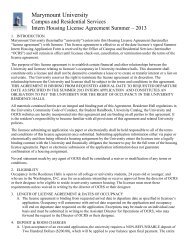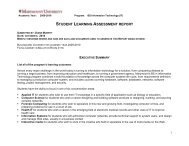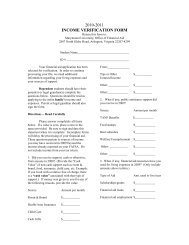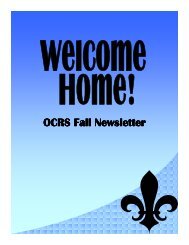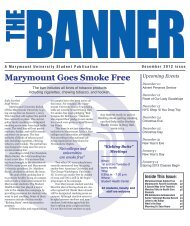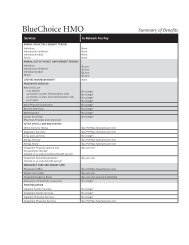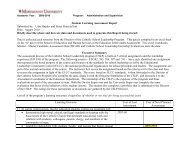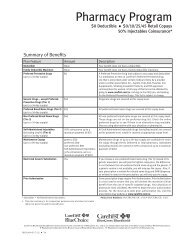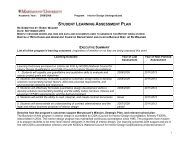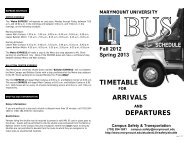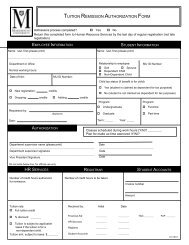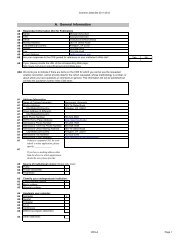EmployEE Handbook - Marymount University
EmployEE Handbook - Marymount University
EmployEE Handbook - Marymount University
You also want an ePaper? Increase the reach of your titles
YUMPU automatically turns print PDFs into web optimized ePapers that Google loves.
Sexual Harassment is a form of sex discrimination and is prohibited under Sec.<br />
703 of Title VII of the Civil Rights Act of 1964 and Title IX of the Education<br />
Amendments of 1972. Unwelcome sexual advances, requests for sexual favors<br />
and other verbal or physical conduct of a sexual nature constitute sexual<br />
harassment when:<br />
Submission to such conduct is made either explicitly or implicitly a term<br />
or condition of an individual’s employment or academic achievement or<br />
advancement (quid pro quo), or;<br />
Submission to or rejection of such conduct is used or threatened or insinuated<br />
to be used as the basis for decisions affecting employment, wages, promotion,<br />
assigned duties, or academic standing or an individual, or:<br />
Such conduct has the purpose or effect of interfering with an individual’s<br />
work or academic performance or creating an intimidating, hostile or<br />
offensive working or academic environment (hostile environment).<br />
A key word in this definition is “unwelcome.” Unwelcome or offensive conduct<br />
with sexual overtones that occurs in the academy or educational environment is<br />
sexual harassment. Courts have held that whether or not conduct is unwelcome<br />
is based on the victim’s perception and not that of the harasser. Such conduct<br />
may be verbal (i.e., jokes, derogatory sexual remarks, invitations) nonverbal<br />
(i.e., gestures, suggestive actions, facial expressions), pictorial (i.e., insinuative<br />
graphics, photographs, and/or other suggestive objects), or physical (i.e., patting,<br />
stroking, cornering, assault.)<br />
3. Consensual Relationships<br />
Amorous and/or sexual relationships between faculty and students, staff<br />
and students, or supervisors and subordinate faculty and staff are viewed as<br />
professionally unethical and violate <strong>Marymount</strong> <strong>University</strong> rules of conduct and<br />
therefore may be subject to discipline. Such relationships have the potential for<br />
adverse consequences, including the filing of sexual harassment complaints.<br />
Given the asymmetry of power in a relationship where one person awards grades<br />
or makes promotion or salary decisions, the consensual nature of the relationship<br />
is inherently suspect. It is incumbent upon those with authority not to abuse or<br />
appear to abuse the power with which they have been entrusted. Should a charge<br />
of sexual harassment be brought by a person in a subordinate position, “consent<br />
to the relationship” will not be deemed a sufficient defense or justification for<br />
conduct which otherwise would be deemed sexual harassment under the policy of<br />
the <strong>University</strong>.<br />
4. Computer Messaging and Information Systems<br />
Faculty and staff are cautioned that the misuse of e-mail, voicemail, or other<br />
electronic messaging systems, or the Internet, are violations of the <strong>University</strong>’s<br />
computer policy and may give rise to claims of harassment. Faculty and staff may<br />
not generate, should not receive, and must not forward any message or graphic<br />
that might be taken as offensive based on race, religion, ethnicity, national origin,<br />
gender, sexual orientation, age, disability, marital status or veteran’s status, or<br />
other categories protected by applicable law. This includes the generation or<br />
forwarding of offensive “humor” that contains sexually offensive terms, or terms<br />
25



